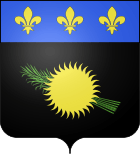Politics of Guadeloupe
Guadeloupe sends four deputies to the French National Assembly and three senators to the French Senate.
 |
| This article is part of a series on the politics and government of Guadeloupe |
|
|
See also: Politics of France |
| National holiday | Bastille Day, 14 July (1789) | ||||
|---|---|---|---|---|---|
| Slavery Abolition Day | 27 May (1848) | ||||
| Constitution[1] | 28 September (1958) | ||||
| Legal system | French | ||||
| Suffrage | Universal at 18 years old | ||||
| Executive branch | Chief of state | President François Hollande represented by Prefect |
since 6 May 2012 since 12 June 2006 | ||
| Head of government | President of the General Council Jacques Gillot President of the Regional Council Victorin Lurel |
since 26 March 2001 since 22 April 2004 | |||
| Elections | French president elected by popular vote for five-year term; Prefect appointed by the French president on advice of the French Ministry of the Interior; General and Regional Council presidents elected by membership of those councils. | ||||
| Election results | See regional elections | ||||
| Legislative branch | Unicameral General Council (Conseil général; 42 seats) Unicameral Regional Council (Conseil régional; 41 seats) | members elected by popular vote to serve six-year terms | |||
Elections Guadeloupe elects three representatives to the Sénat; elections last held September 2011, next due September 2017
Guadeloupe elects four representatives to the Assemblée nationale; elections last held June 2012, next due June 2017
|
General Council
Regional Council
| ||||
| Election results | General Council
Regional Council
| ||||
| Judicial branch | Court of Appeal (Cour d'Appel) in Basse-Terre; Assize Court (Cour d'assises) in Basse-Terre to try felonies, consisting of three judges and a popular jury; Several first instance courts of varying competence levels, in Basse-Terre, Pointe-à-Pitre, Saint-Martin and Grand-Bourg. | ||||
| Political parties | Guadeloupe Communist Party (PCG) · FGPS · Progressive Democratic Party (PPDG) · Union for a Popular Movement (UMP) (formerly the Rassemblement pour la Republique, RPR) · Socialist Party (PS) · Union for French Democracy (UDF);· Guadeloupe unie, socialisme et réalités (GUSR) | ||||
| Pressure groups | Union for the Liberation of Guadeloupe (ULPG) · General Federation of Guadeloupe Workers (CGT-G) · General Union of Guadeloupe Workers (UGTG) · Movement for Independent Guadeloupe (MPGI) · The Socialist Party | ||||
| International membership |
FZ · WCL · WFTU | ||||
General Council of Guadeloupe
The general council is composed of 43 seats; whose members are elected by popular vote to serve six-year terms.
Composition
| Party | seats | |
|---|---|---|
| • | Miscellaneous Left | 22 |
| • | Socialist Party | 10 |
| Miscellaneous Right | 7 | |
| Independents | 2 | |
| Union for a Popular Movement | 2 | |
Regional Council of Guadeloupe
The regional council is composed of 41 seats; whose members are elected by popular vote to serve six-year terms.
Composition
| Party | seats | |
|---|---|---|
| • | Socialist Party | 31 |
| Union for a Popular Movement | 4 | |
Current Deputies
Guadeloupe also elects 4 seats to the French National Assembly, the last elections were held in June 2012.
| Constituency | Member | Party | |
|---|---|---|---|
| 1st | Éric Jalton | PS | |
| 2nd | Gabrielle Louis-Carabin | PS | |
| 3rd | Ary Chalus | GUSR | |
| 4th | Victorin Lurel | PS | |
See also
References
- ↑ French constitution.
- ↑ to elect half the membership.
This article is issued from Wikipedia - version of the 8/13/2016. The text is available under the Creative Commons Attribution/Share Alike but additional terms may apply for the media files.
.svg.png)